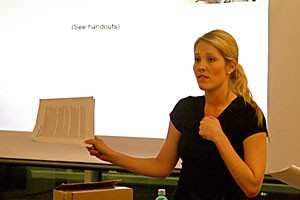While there are no official candidates yet, the Associated Students of the University of Arizona election cycle got its start Friday when applicants were introduced to a new set of campaign rules.
David Martinez III, ASUA elections commissioner, said some applicants have discrepancies in their collection of the 1,000 signatures needed to run for ASUA office.
Many of those discrepancies are duplicated names, probably due to an extended deadline for applications when some students may have unwittingly signed on the same candidate twice, Martinez said.
The elections oversight team is combing through signatures, aiming to determine the official candidate roster this week. Candidate hopefuls need time to form their campaigns, so the official election season began without the official list intact, Martinez said.
Campaigning begins Feb. 12, followed by primaries three weeks later and a general election one week after that, Martinez said.
“”There can’t be any more delays,”” he said.
The new elections code is about half the size of the one used last year, giving much more discretion to those overseeing the election, said ASUA President Erin Hertzog.
The biggest change to this year’s code is a violations procedure that is less harsh and allows each violation to be weighed on an individual basis, Hertzog said.
Violations will all be assessed personally by Martinez, who uses the new code as a guide for how much weight to give each infraction, which could result in a warning, fine, loss of campaign rights or disqualification.
Last year’s rules separated violations into minor and major categories, specifically outlining missteps in campaigning that did not consider the candidate’s intent, Hertzog said.
For instance, campaigning at an ASUA function was listed as a major infraction. If someone wore a campaign button to an ASUA senate meeting by accident, the button’s candidate would still be assessed a heavy penalty.
“”It was nuts,”” Hertzog said.
The rules led to Rhonda Tubbs, a finance senior and then-candidate for executive vice president, being disqualified after receiving more than 34 percent of the vote in last year’s primary elections.
The controversy over Tubbs’ disqualification was one of the driving factors in creating this new elections code, Hertzog said.
“”We don’t want that to happen this year,”” she said. “”The purpose is to keep more people in.””
Missy Frazelle, deputy elections commissioner, said she thinks it might be possible for problems to arise with the new violations system, but that none are apparent right now.
“”Hopefully, things will go smoother,”” she said.
Other changes this year involve finances, with lower spending limits – including $400 for presidential candidates – that Martinez said were meant to be more inclusive.
ASUA-recognized clubs can also get in on the campaign act, but their contributions cannot be more than $100 per candidate or push a candidate over the spending limit.
Rules involving acceptable campaigning locations have also been changed to reflect problems from past years, Hertzog said.
The code gives candidates more freedom to campaign off-campus, at sporting events and in the Student Union Memorial Center. Only ASUA events and offices remain off-limits.
Official campaigning starts Feb. 12, followed by primaries three weeks later and a general election one week after that, Martinez said.









